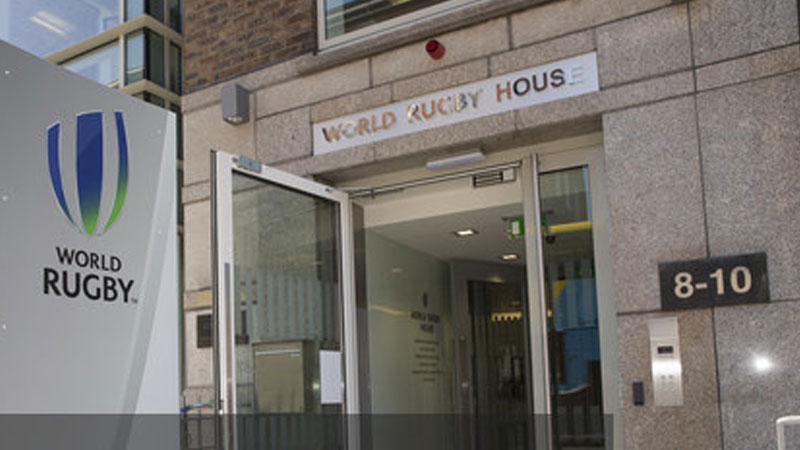Every sport needs some form of government to help control and make crucial decisions that will have massive effects on the sport. Rugby is no different in this way.
Who is the governing body of Rugby? World Rugby is the governing body for Rugby Union. World Rugby makes the majority of the decisions on Rugby across the world including regulations, laws and organising tournaments. World Rugby is also in charge of Rugby Sevens.

The Origins of Organised Rugby
Much like any other sport, rugby union needs a governing body that makes the crucial decisions that have big effects on the landscape of the sport. This was why Word Rugby was created all the way back in 1886, originally called the International Rugby Football Board.
At its creation, there were three founding members in Scotland, Wales and Ireland with England following suit four years later. The body was founded due to arguments between the home nations on the exact rules of the game and this led to some disputes that caused Scotland to refuse to play England in the 1885 Home Nations Championship.
It meant that a governing body needed to be created so that the exact rules of the game could not be disputed, with England originally refusing to join because they felt they should have greater representation due to having more clubs. They eventually gave in four years later and the official rules of the game were first formed.
In 1948, three southern hemisphere nations joined the board with Australia, New Zealand and South African all getting one seat each, before gaining another ten years later. France was admitted in 1978 and the USA in 1987.
Since then, the body has grown significantly and there are currently 108 member unions part of World Rugby, with an additional 18 being associate member unions. World Rugby splits these members into six categories based on the continent they are in. All of the members are also a part of their continents rugby administrative body.
Today, World Rugby makes the big decisions on the game of rugby union. For example, World Rugby suspended Russia from international and European continental rugby competition after the country’s invasion of Ukraine. The board will also decide who becomes a member through a long process of vetting.
What is the purpose of World Rugby?
The first purpose of World Rugby is determining the laws of the game. This is done by a standing Laws Committee which is established by World Rugby. The laws of the game are determined by World Rugby and then are circulated to the different national rugby unions. There are a few different variations of the rules to suit youth and sevens rugby.
While this is the main purpose of World Rugby, it has a variety of other objectives. Advancing the game of rugby is crucial to the sport and so they will often invest in different rugby unions they believe can help to increase the competitiveness of international rugby union. Most of the money available for funding comes from the Rugby World Cup.
Ever since the first Rugby World Cup in 1987, World Rugby has organised the competition that takes place every four years. The tournament has continued to be profitable and the profit from the competition is used to fund programs and unions across the world.
World Rugby also organises other competitions like the sevens and women’s Rugby World Cup. Part of the progression of the game of rugby is the future players. This is why World Rugby organises competitions specifically for youth rugby which include the U20s world cup which was held every year prior to the Covid-19 pandemic.
World Rugby also gives out awards and has done since 2001, recognising outstanding achievements in rugby union. The main award is World Rugby men’s 15s Player of the Year which is currently held by French scrum-half Antoine Dupont. World Rugby hands out a variety of awards usually at an annual ceremony.
Who is in Charge of World Rugby?
The current chairman of World Rugby is former English player Bill Beaumont. Beaumont began playing rugby from a very young age and played well enough to earn his first England call up in 1975. Beaumont had to retire seven years after his international debut due to successive concussions.
During his playing career, Beaumont played 34 times for England, 21 of those as captain. He also became captain of the British and Irish Lions in 1980, becoming the first English captain of the Lions for 50 years. After his career, Beaumont quickly moved into governing, representing England on the International Rugby Board since 1999. He became chairman of the RFU in 2012. Four years later, Beaumont applied to be the Chairman of World Rugby to replace Bernard Lapasset and he was voted in unanimously and has held the role ever since. He was vice chairman of World Rugby from 2008 to 2011.
How is Rugby Governed in England?
The Rugby Football Union (RFU) is the governing body of Rugby Union in England. It was formed in 1871 and joined World Rugby in 1890 having had some disagreements about initially joining when World Rugby was formed four years prior. Today it is the largest rugby union in the world with 2.5 million registered players.
There are a few different important people involved in the decision making of the RFU. The President of the RFU is Jeff Blackett, with the chairman of the RFU being Tom Ilube CBE. The executive staff are the ones who make most of the rugby based decisions, with the CEO of the RFU being Bill Sweeney.
Conor O’Shea holds the most rugby based role within the executive directors of the RFU. O’Shea is a former Irish international who became a coach after his playing career, winning the Premiership with Harlequins in 2012 as well as the European Challenge Cup. He is Director of Performance Rugby.
While most of the other executive directors make the non-rugby decisions, O’Shea is focused on the players, coaches and officials across all pathways of Rugby Union in England.
